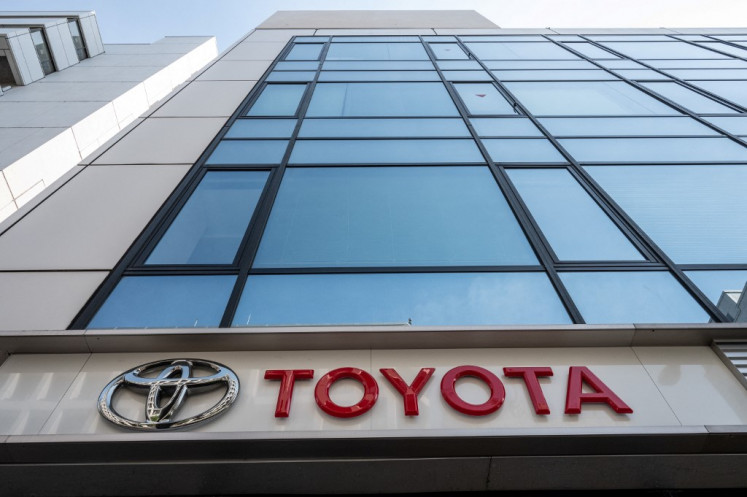Popular Reads
Top Results
Can't find what you're looking for?
View all search resultsPopular Reads
Top Results
Can't find what you're looking for?
View all search resultsIBM: Using tech to enhance sustainability
Sustainability has become a hot topic, not only for government policymakers but for corporate leaders as well. In the coming years, sustainability issues will play a huge role in defining corporate agendas and could recalibrate the relationship between business and society. These developments are welcome, and corporate leadership is needed now more than ever.
Change text size
Gift Premium Articles
to Anyone
By Agnes Heftberger
Sustainability has become a hot topic, not only for government policymakers but for corporate leaders as well. In the coming years, sustainability issues will play a huge role in defining corporate agendas and could recalibrate the relationship between business and society. These developments are welcome, and corporate leadership is needed now more than ever.
However, the walk has not always followed the talk. Only 37 percent of companies have aligned sustainability objectives with their business strategies; only 33 percent have integrated sustainability objectives and metrics into business processes; and only 40 percent have identified initiatives to close their sustainability gaps for change.
These statistics come from a recent IBM Institute for Business Value (IBV) and Oxford Economics study that polled 1,958 executives in 32 countries to map their sustainability readiness.
“Lots of talk is happening, but not enough action,” the study reported. “While 86 percent of companies have a sustainability strategy, only 35 percent have taken action on that strategy.”
Fewer than 50 percent of the business leaders surveyed said they were willing to change existing business practices at the expense of profits to improve sustainability. And only 27 percent viewed sustainability as a core element of their business value.
“These findings highlight the immense sustainability challenge companies face in converting their intentions and pledges into reality,” the IBV report stated. “Achieving change at scale requires a fundamental reconfiguration of how value is created. And businesses need to lead—rather than follow.”
Indonesia’s green plan
Indonesia has committed to achieving the Sustainable Development Goals (SDGs) by 2030. The National Development Planning Ministry developed an SDG road map to identify the challenges, policy strategies and progress indicators for each SDG.
The government also developed a series of initiatives to achieve the SDGs, such as promoting mangrove rehabilitation to slow deforestation and continuing the mobilization of climate finance and innovative financing, such as hybrid financing, green bonds and green sukuk (Islamic bonds). The energy sector includes electric vehicle ecosystem development; the construction of Southeast Asia’s largest solar power plant; and the use of new and renewable energy, including biofuel.
Digital transformation, sustainable investment and policy reform will catalyze progress toward development goals, strengthen the country’s ESG ecosystem and ultimately create shared value for all.
Technology has an important part to play in helping government agencies and businesses meet sustainability goals. Currently, the ICT sector is responsible for between 1.8 and 3.9 percent of global greenhouse gas emissions and data centers account for 3 percent of annual total energy consumption. Any advances in data center tech will mean huge benefits.
That’s where a unique server from IBM, with green computing at its core, comes in. Called LinuxONE, it reduces energy consumption by a whopping 75 percent, the carbon dioxide footprint by 850 metric tonnes annually and requires 50 percent less data center space compared to similar industry-grade servers.
It also features quantum-safe security algorithms and meets security requirements for sensitive workloads, including those in regulated industries such as financial services. The LinuxONE Emperor 4 server protects data in use while providing end-to-end encryption for data at rest and data in flight. This provides businesses with a solid data and cybersecurity strategy.
Remarkable results
Are there any early adopters? Here are a few who have achieved remarkable results with LinuxONE:
- Citi focuses on reducing the environmental footprint of its facilities by improving hosting densities with lower power consumption. “As our business increasingly becomes digital-first, traditional IT solutions add more physical servers and increase floor space,” said Martin Kennedy, Citi’s managing director of tech infrastructure. “LinuxONE with MongoDB provides vertical scale and critical protection against data breaches and cyberattacks, helping optimize data centers while lowering our overall carbon footprint.”
- Deloitte is using LinuxONE to help clients optimize their data centers and could realize up to US$40 million in human capital and licensing savings over three years. “Thanks to the LinuxONE platform, we can help our clients access a whole new world of possibility,” said Ted Schieke, Deloitte’s vice president of alliance management. “Clients can free up more resources that they can invest in new solutions and services.”
- The United Kingdom’s Met Office migrated its databases from x86 systems to the LinuxONE platform to ensure it could handle massive peaks. “We can bet the business on LinuxONE now,” said Graham Mallin, the Met Office’s executive head of technology. “I can sleep easy knowing that we can absolutely rely on our data delivery systems.”
- A large Islamic bank in Malaysia wants to promote the habit of savings and investment among Malaysians. They deployed LinuxONE to deliver the best savings and banking experience to their clients.
The bottom line: Today’s hybrid and multi-cloud environments require clients to deploy workloads where it makes the most sense for their business needs.
“IBM’s Cloud Hyper Protect Virtual Servers provide a public cloud environment in which the cloud tenant retains complete authority over virtual servers for workloads that contain sensitive data.
“Built on LinuxONE and running on the IBM Cloud, this service provides customers authority over their data, workloads and encryption keys with privacy and cybersecurity.”
The author is general manager and technology leader at IBM ASEANZK (Australia, New Zealand, South Korea, Southeast Asia).
This article is published in collaboration with IBM











